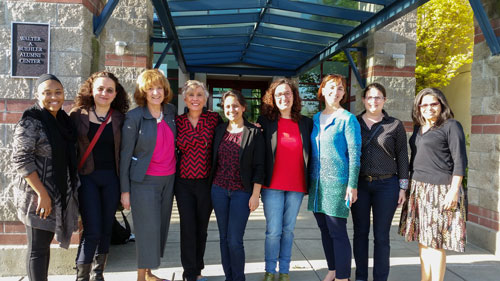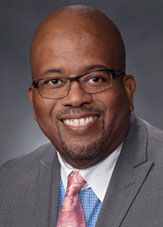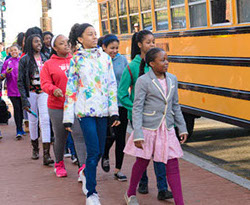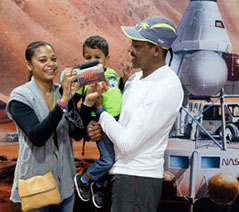
Multicultural Perspectives on Science
Building on the success resulting from an NSF sponsored Institutional transformation initiative to support women in STEM, the Center for Multicultural Perspectives on Science (CAMPOS) was established. CAMPOS has grown with the support of the UC Davis Chancellor and Provost, in partnership with STEM Deans, department chairs, and faculty search committees. It has successfully helped to increase the number of Latina Stem faculty. To date, 13 have been recruited in areas that range from microbiology and molecular genetics, neurobiology, physiology, to food science, and technology, mathematical and physical science, computer science, and others.
CAMPOS founding director, Professor of Nursing Mary Lou de Leon Siantz established CAMPOS with a vision to inspire Latinas to careers in STEM science with faculty role models that engage with local Latino communities, inspire, and mentor the next generation as they engage in scientific discoveries at UC Davis. CAMPOS mission seeks to support discovery through an inclusive environment that is diversity driven, mentorship grounded, and career success focused. It builds on UC Davis’s commitment to transform the university to support diverse women in science.
CAMPOS uniquely supports it faculty scholars through its leadership institute, committees that help to successfully launch entry into the UC Davis system, professional networking through its monthly Cafecitos, the opportunity to participate in a faculty success program, and summer research support. CAMPOS faculty scholars are exceptional scientists in a STEM discipline. They are also taught to communicate their research to congressional representatives and their staff to identify the need for continued support of science over time. They are selected for their transformational thinking, unique perspectives, interdisciplinary approaches, and leadership potential to impact their STEM discipline in profound and enduing ways. Their discoveries, innovations, and technological breakthroughs will contribute to the public good, locally, nationally, and globally. A CAMPOS faculty scholar is a role model for future scientists and scholars who share their vision of diversity and inclusion, as key components of the Academy in the 21st Century.
 Closely working with the Center Director is the CAMPOS committee. It is composed of Professors in the traditional STEM disciplines including a representative from Social Science, a discipline that the NSF includes in its STEM definition. The CAMPOS committee seeks to vet each candidate’s fit with the CAMPOS mission and vision, including experience mentoring Latino students and commitment to give back to the community in ways that also support their career trajectory, needed for sustainable university success. Committee members represent the Center in their department faculty, and schools. They also collaborate with others working on the NSF sponsored institutional change initiatives that include transforming policy and practices, inclusive campus climate, mentorship and networking, capital resources network, and the social sciences research initiative.
Closely working with the Center Director is the CAMPOS committee. It is composed of Professors in the traditional STEM disciplines including a representative from Social Science, a discipline that the NSF includes in its STEM definition. The CAMPOS committee seeks to vet each candidate’s fit with the CAMPOS mission and vision, including experience mentoring Latino students and commitment to give back to the community in ways that also support their career trajectory, needed for sustainable university success. Committee members represent the Center in their department faculty, and schools. They also collaborate with others working on the NSF sponsored institutional change initiatives that include transforming policy and practices, inclusive campus climate, mentorship and networking, capital resources network, and the social sciences research initiative.
Integral to CAMPOS is its alignment with the Social Science Research Component an initiative sponsored by NSF institutional transformation. Through this initiative the research team is discovering the journeys that Latina have endured over time to become successful STEM scientists. We have learned that it takes a village of mentors that range from extended family to teachers, and employers to identify a spark and nurture its development against all odds. We have also found that Latina faculty experience feelings of isolation and lack of professional mentoring in home departments.
As it continues to grow, CAMPOS will expand its multicultural emphasis to embrace other multicultural groups, especially African American while it continues to attract Latina STEM scientists. The long term goal is to not only become a permanent and sustainable Center, but especially, a national model of support for Latina and other diverse women in STEM science as well as a multicultural STEM research resource Center. Its focus will continue to support changing the face of STEM to reflect the demographics of the U.S. It will also seek to engage with the local community to promote STEM science through undergraduate student participation in STEM, special K – 12 STEM programs, and research through the Latina Border STEM network. CAMPOS will also continue to study the risk, protective factors and resilience of multicultural women in STEM science to develop and test effective interventions that will support the next generation of diverse university women in science.
Ken Darby
Generation Beyond
Imagine getting on a school bus in the morning, but instead of traveling to class, you take a journey along the surface of Mars. When the bus starts moving, you see the Curiosity Rover, the robot that’s been exploring Mars since landing on that planet four years ago. You experience a dust storm and other realistic sounds and graphic displays, simulating a 200-mile ride along the planet’s surface. When the Mars bus was unveiled last spring at the USA Science & Engineering Festival, there were long lines of enthusiastic riders.
This virtual tour of Mars is part of an innovative, hands-on program of STEM (Science, Technology, Engineering, Math) education aimed at middle school students called Generation Beyond, launched earlier this year by Lockheed Martin, the global defense and aerospace company. The bus is the first immersive virtual reality vehicle ever built, and represents the company’s interest in ensuring that the country’s next generation is prepared for the future.
Math) education aimed at middle school students called Generation Beyond, launched earlier this year by Lockheed Martin, the global defense and aerospace company. The bus is the first immersive virtual reality vehicle ever built, and represents the company’s interest in ensuring that the country’s next generation is prepared for the future.
“It’s an opportunity to harness an excitement and enthusiasm about deep space exploration and use that to inspire and educate. It makes sense for us to get kids excited at a young age.” said Ken Darby, Lockheed Martin’s Director of Global Marketing Communications. “Who is going to be going to Mars in the future? It’s likely the kids that are in school today, and we believe it is our responsibility to ensure that the first generation of deep space explorers prepare for that journey. When you think of middle schoolers today, you have to come up with something that’s very creative to attract them. We want to inspire kids for deep space exploration, excite them about that, and make it fun.”
While the “Lockheed Martin Mars Experience Bus” is traveling the country to bring the experience of exploring Mars to students nationwide, the company’s STEM education program includes new interactive tools for students and teachers.
 The website at www.generation-beyond.com poses an opening challenge to young students with the line, “The first person to visit Mars is in school today. Will it be you?” The Space Skills Academy offers an online deep space curriculum for students and teachers, including lesson plans and classroom activities, including projects where the whole family can participate. There’s also the “Hello Mars” smartphone app that allows users to find Mars on the sky using their phone, as well as receive Mars weather reports in real time.
The website at www.generation-beyond.com poses an opening challenge to young students with the line, “The first person to visit Mars is in school today. Will it be you?” The Space Skills Academy offers an online deep space curriculum for students and teachers, including lesson plans and classroom activities, including projects where the whole family can participate. There’s also the “Hello Mars” smartphone app that allows users to find Mars on the sky using their phone, as well as receive Mars weather reports in real time.
Generation Beyond is a unique and comprehensive education program aimed at piquing and maintaining an interest in deep space exploration, which are part of the exploding STEM field. These jobs are the fastest-growing in the U.S. economy and among the highest-paying, but many go unfilled because of the lack of qualified applicants. The U.S. Department of Labor reports that there are currently two science and tech job openings for every applicant, while at the same time calculating that nearly half of all new jobs in the next decade will be STEM related. Lockheed Martin says it wants to make sure it does its part to help make sure our country’s youngsters are the ones filling those jobs in the years to come.
“It’s part of our commitment to the community and the government that we serve.” says Darby. “We have a long history of funding STEM education programs because we want to nurture and equip the next generation of scientists, explorers and engineers.”
history of funding STEM education programs because we want to nurture and equip the next generation of scientists, explorers and engineers.”
That includes outreach to minority students, adds Darby. While Latinos are the fastest-growing ethnic group in the country, just eight percent of STEM degrees are awarded to Latino graduates, and Latinos represent barely seven percent of the STEM workforce in the United States. The reaction to the Generation Beyond program has been overwhelming.
“As an African American male,” he says, “it makes me proud to see the number of young minority students very enthusiastic and with questions about STEM fields. It’s really exciting to pair technology with the enthusiasm of space exploration, and it’s real gratifying to see that enthusiasm across diverse audiences.”
Lockheed Martin has long played a key role in STEM education and space exploration, partnering with NASA on missions to Mars and generously supporting STEM programs nationwide for young Latinos and others. “Our children make up a generation that will change our universe forever. This is the generation that will walk on Mars, explore deep space, and unlock mysteries that we can’t yet imagine,” says Marilyn Hewson, Lockheed Martin President and CEO. “They won’t get there alone. It’s our job to prepare, inspire, and equip them to build the future - and that’s exactly what Generation Beyond is designed to do.”
Patricia Guadalupe
Inspiring Latino Youth
Did you know that an estimated fifty percent of all engineers working in the U.S. today will retire within fifteen years? This will likely cause a tremendous problem for our technological base. For certain, there is an urgent need to address the Science, Technology, Engineering, Math (STEM) capabilities of the country. The expected shortfall of STEM workers is recognized by the White House and billions of federal dollars are being distributed at the state and local levels to encourage training, jobs and investments in STEM based endeavors. Corporations also recognize the critical need for STEM skills and are investing in people and programs to develop a pool of talent that can produce the next generation of innovative products and services. In fact, many of these corporations are sponsoring community activities and events to promote STEM skills education and are developing in-house teaching and training programs.
-copy.jpg?crc=276584152) My organization, the Latino STEM Alliance (LSA), is a Massachusetts-based non-profit organization that partners with schools, private industry, community groups and academia to bring STEM experiences to underserved and at-risk youth who normally would not have such an opportunity. Our goal is simple: to increase the number of underrepresented minorities that pursue and attain STEM degrees or careers while fostering skills of collaboration, critical thinking and creativity.
My organization, the Latino STEM Alliance (LSA), is a Massachusetts-based non-profit organization that partners with schools, private industry, community groups and academia to bring STEM experiences to underserved and at-risk youth who normally would not have such an opportunity. Our goal is simple: to increase the number of underrepresented minorities that pursue and attain STEM degrees or careers while fostering skills of collaboration, critical thinking and creativity.
Our plan follows a high-touch, multi-directional approach that includes harnessing children’s natural enthusiasm for learning by providing hands-on learning experiences, team-building exercises, and opportunities to showcase the products of their work, along with offering parents with opportunities to become involved in their students’ learning and encourage success. We also partner with inner-city schools to augment after-school day care activities with STEM enrichment opportunities and with area universities and employers to enhance our own programming and to provide children with a vision of the numerous opportunities available on the STEM career ladder.
When people ask us if our tactic is working, I immediately think of “Marco,” one of many students who participated in the 2016 Latino STEM Alliance Annual Robotics Competition.
Marco’s parents did not send Marco to school until he was 8 years old. For the first six years, he struggled through special-ed classes, trying to catch up, but he still experienced considerable failure. He felt it acutely when learned he would have to repeat eighth grade while his classmates would move on to high school.
Today, Marco says that being retained was “the best thing that could’ve happened.” He was able to join our robotics program and the experience impacted his self-efficacy. In robotics, Marco found likeminded peers and support group of sorts. The robotics instructor encouraged the students to share ideas and different approaches to solve a problem and to learn from their failures—and then move on to the next challenge. Marco discovered the benefits of teamwork and tenacity. He recognized that he had stopped trying in school and decided to put more effort into his work in the classroom.
Marco’s team reached the semi-final round of LSA’s year-end competition. Although his team did not win, he found a newfound interest in engineering. Marco now envisions a future of attending Northeastern University and then becoming famous for making an artificial intelligence robot for hospitals throughout the world. He now believes in himself and his future.
Other students who attended LSA wrote to us after the program saying that STEM taught them that they can achieve anything if they put their mind to it.
Following the LSA program, many opportunities follow for further success in STEM for young Latinos. However, for a young man to access many of those opportunities, he must first register with the Selective Service System. Failure to register will put a block on college loans and grants, access to job training and certification programs, and restrict eligibility to millions of available federal, state municipal and contractor jobs.
It’s critically important that young men know about the registration requirement and follow through. It is a federal law that all men must register when they become 18 and it’s a civic duty. It’s important to know that the door closes forever if a man does not register by his 26th birthday. If he fails to register by 26, he can be permanently barred from benefits like loans, training, and careers. And failure to register can also impact how quickly an immigrant man can become a citizen.
Most troubling is that, unfortunately, the same at-risk young men our program seeks to support, suffer the highest risk of failing to register.
The good news is that registration is easy. Men can register in less than a minute online at sss.gov, or check the appropriate box on the Free Application for Federal Student Aid (FAFSA). All immigrants must register—documented and un-documented. Those men without a social security number can register at any post office, or print out a registration form from sss.gov, and mail it in. That two minutes that can mean a lifetime of opportunities to pursue their new dreams of careers in STEM-related fields.
To inspire students to consider STEM-related careers through hands-on STEM enrichment activities and relevant role-models, visit our website www.latinostem.org.
Amanda Martinez is the Executive Director of the Latino STEM Alliance










